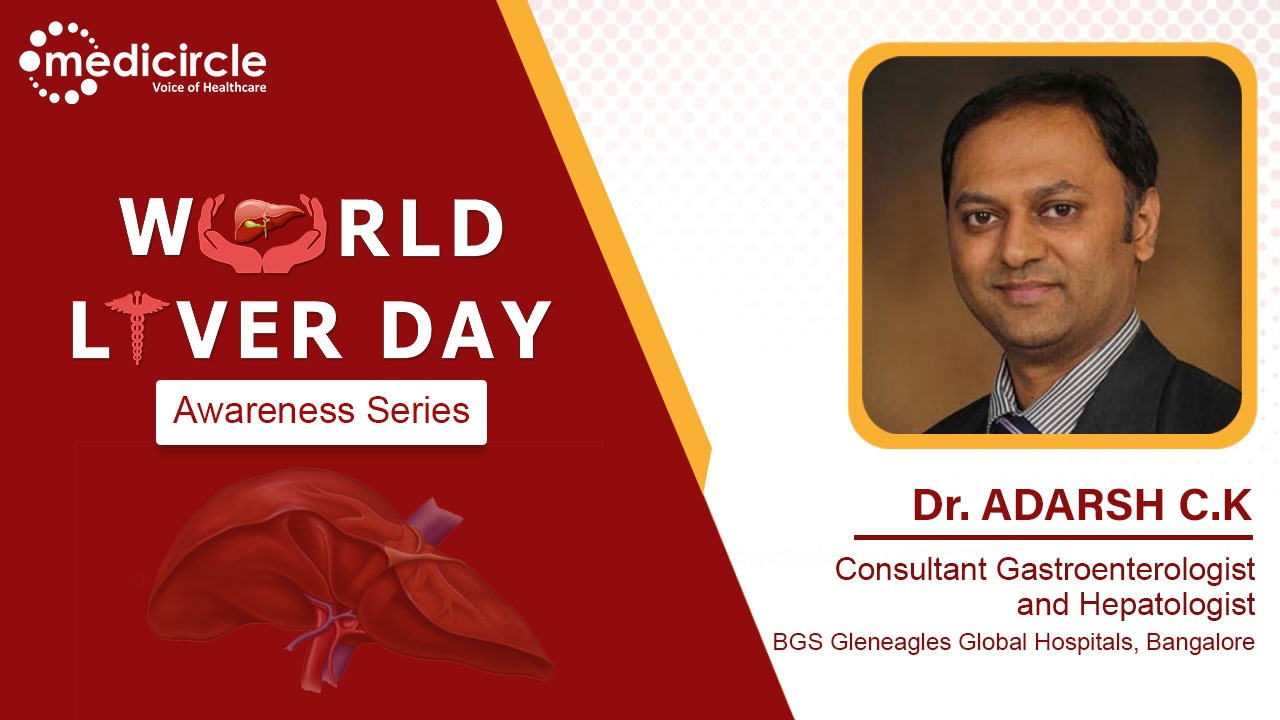The liver is an important organ that plays a central role in all metabolic processes in our body. On the occasion of World-Liver-Day which falls in April, Medicircle is conducting a series with eminent hepatologists and gastroenterologists to spread awareness about vital aspects related to liver and liver diseases.
Dr. Adarsh CK is the Chief Gastroenterologist, Hepatologist and Advanced therapeutic endoscopist, BGS Gleneagles Global Hospitals, Bangalore. He has been associated with St. John’s Medical College in the past. He has multiple national and international papers to his credit. He has special interest in Drug induced hepatitis, advanced therapeutic interventions like ERCP, Endoscopic ultrasound, Spyglass, Double balloon enteroscopy etc.
Liver is the engine of a body
Dr. Adarsh explains, “Liver is the largest organ in the body after skin. It is involved in at least 500 vital functions in our body, every minute. Some of the major functions are – It secretes bile, which is a juice that helps indigestion. It is involved in the metabolism of protein, carbohydrate as well as fat. It is a place where multiple protein synthesis happens. One of the proteins is albumin, which is very essential for our daily life. Other proteins are also synthesized including clotting factors, that is why whenever there is liver disease, people tend to bleed a lot. Another thing is that it also helps in the production of cholesterol, which again has vital importance like many hormones are produced from cholesterol, apart from the production of proteins. The liver also helps in the breakdown or clearance of many drugs, chemicals, and toxins. One of them is bilirubin. So, whenever one is suffering from liver diseases, bilirubin increases and there is jaundice. It degrades many of the medicines we take. It also helps in the storage of multiple vitamins like vitamin A, vitamin B 12. It stores some minerals like iron and copper.”
Healthy habits for the liver
Dr. Adarsh mentions, “You are what you eat, so eat healthy to stay healthy. One has to have a balanced diet, which should consist of vegetables, minerals, and vitamins and one should maintain a healthy weight. We see a lot of patients who are overweight. So, maintaining a healthy weight is very important. How do we maintain that is by diet and by regular physical activity. BMI that is the body mass index should be 20 to 25. Every day 45 to 50 minutes of brisk walk or regular exercise for five days a week is recommended.
Avoid smoking and avoid alcohol. There is a controversy regarding what is moderate and what is excessive? In general, avoiding alcohol is the best way. Avoid illicit drug use. Patients with hepatitis B and C should avoid sharing sharp instruments or personalized hygiene items like toothbrushes, nail clippers, those sorts of things. Regular hand washes, especially for prevention from hepatitis A and E which are waterborne infections are required. Practice safe sex and most importantly get vaccinated if you are not vaccinated. We now have COVID vaccines, similarly, there is a hepatitis B vaccine that is available, one has to get vaccinated,” advises Dr. Adarsh.
Screening for fatty liver is very important
Dr. Adarsh points out, “We have seen in our regular practice, people always tell that India is a poor country, we should speak about malnutrition but the thing is that India has got the third-highest number of obese or overweight individuals in the world. Whenever a person is overweight or obese, they start accumulating fat everywhere in the body. The liver also accumulates fat. So, whenever there is fat accumulation in the liver, we call it fatty liver. In general, people always tend to neglect fatty liver. If there are 100 people with fatty liver 20 to 30% of them will end up with the liver disease. So, screening for fatty liver is very important in all patients who are overweight or obese and this is more common in patients who have diabetes or hypothyroidism, or high cholesterol. These are the patients who are at risk of developing fatty liver and they need to be monitored very regularly. Obesity over some time definitely can cause the basis for liver disease,” says he.
Good diet for good liver
Dr. Adarsh emphasizes, “Healthy diet is very important. Our diet should have enough vegetables and fruits. Although all vegetables are good but green leafy vegetables, cruciferous vegetables like spinach, broccoli, etc. are good. In fruits, berries, grapes, etc. are very helpful as they are rich in antioxidants and vitamins. If we talk about beverages, water is the best beverage. If we talk about coffee and tea, they are helpful too as they can decrease the fibrosis within the liver. Beverages like cold aerated drinks, soda, and alcohol are a strict no. Avoid junk food, fried food, snacks that are very high in trans fatty acids and which can damage the liver over some time. For non-vegetarians, fish, which is rich in omega3 fatty acids, are good. Red meat should not be encouraged,” advises Dr. Adarsh.
(Edited by Amrita Priya)

 Dr. Adarsh CK, Consultant Gastroenterologist, and Hepatologist talks about how vital the liver is, healthy habits to keep the liver healthy, why screening for fatty liver is significant, and recommends a balanced diet for a healthy liver.
Dr. Adarsh CK, Consultant Gastroenterologist, and Hepatologist talks about how vital the liver is, healthy habits to keep the liver healthy, why screening for fatty liver is significant, and recommends a balanced diet for a healthy liver.









.jpeg)


.jpg)







.jpeg)

.jpg)




.jpg)




.png)

